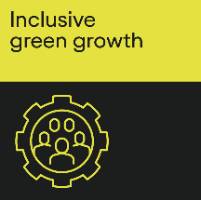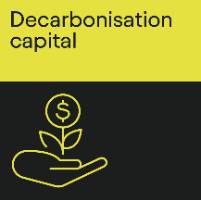GET Roundtable Topics
Leadership Roundtable 1 - Monday 01 July 2024 - 12:00 - 13:15
Strategic Theme:

Financing the energy transition in emerging economies
By 2050, 86% of the world’s people will live in the Global South and East. This rapidly expanding population will drive extraordinary energy demand growth in some of the world’s most energy poor and coal reliant regions. Without a concerted programme of energy capacity upscale – involving cleaner hydrocarbons and renewables – and coal substitution, the demographic boom will only serve to exacerbate already entrenched problems and hamper regional economic growth prospects.
Funding for new projects in the world’s emerging economies still lags far behind requisite levels. Across Africa, annual investment in renewables averaged US$5bn between 2010-2020 – tenfold growth against the previous decade but significantly short of the annual US$60bn needed. The fact that Africa’s untapped renewable energy capacity could service her projected electricity demand in 2040 1000-times over only serves to underscore the scale of the missed opportunity. The continent is simultaneously home to 14 of the world’s 20 most climate vulnerable countries and, in the words of a 2023 Economist Impact report “a renewable energy powerhouse waiting to happen.” Any truly just transition in Africa must turn the continent’s abundance of resources into inclusive economic growth, following the same growth pathways that served the Global North during the first 200 years of industrialisation.
Though the nature of the challenge in Asia Pacific and Latin America differs, the root problem – a shortage of necessary development funds – is much the same. Too often, the balance of risk tilts heavily towards potential investors, dampening enthusiasm for potentially transformative projects. The UAE Consensus at COP 28 included a key objective of ensuring that finance for climate becomes more available, accessible, affordable and is seen as an economic opportunity.
It is incumbent on policymakers and intergovernmental financial institutions to create the conditions for bankable investments, via the drafting of new, viable and long-term energy strategies, simplified regulatory regimes and other means. Governments, though, can only do so much; ultimately, two-thirds of total investment in clean energy will need to come from private sector sources. Failure to adequately address the issue will only widen the gap between the world’s haves and have-nots.
Inclusive green growth
Harnessing innovation, capturing economic growth opportunities, reskilling the labour force, and easing congestion in supply chains.
Leadership Roundtable 2 - Monday 01 July 2024 - 14:00 - 15:30
Strategic Theme:
Citizen and community empowerment for a people-led energy transition
Among its numerous precepts, the Paris Agreement required signatories to affirm the importance of public awareness, engagement and participation in the transition to a lower carbon future. It was, in effect, an acknowledgement that net zero can only be achieved with the consent of citizens. But while the social consensus on net zero has often seemed fragile, in many parts of the world it now seems to have fractured entirely.
A combination of factors, some only tangentially related to climate, have seen net zero absorbed into the “culture war” that increasingly defines politics in the industrialised west. For sceptics, climate policies negatively affect the material conditions of life. Higher prices, slower growth and the curtailment of basic liberties are frequently cited as the real fruits of net zero legislation. Meanwhile, increasingly bold protest movements make the counter claim that, under the influence of vested interests, policymakers are not moving fast enough to avert climate catastrophe.
The question for politicians and industry leaders alike is how to communicate the urgent need for action to sceptics, the importance of pragmatism to activists, all while sounding credible and consistent.
More must be done to inform and engage the public, in line with the commitments of the Paris Agreement, to build social resilience against climate misinformation. Community outreach initiatives, local content in procurement, and other forms of place-based action can be used to create good news stories and change misleading, often populist narratives on the energy transition. But the question remains of how best, if at all, energy and carbon-intensive industry leaders should seek to engage with climate activists and protest movements? And has anyone yet resolved the question of how the burden of increased costs related to the energy transition can be equitably shared?
Corporate and consumer behaviour change
Bridging the gap between intentions and actions, rewarding climate adaptation in challenging economic times, demanding transparency, and managing misinformation.
Leadership Roundtable 3 - Monday 01 July 2024 - 16:00 - 17:30
Strategic Theme:

Shareholder values versus shareholder value: Reconciling business imperatives and corporate social responsibilities
Over the previous two decades, environmental and ecological concerns have increasingly come to influence action in the equity markets. More recently, an uptick in shareholder activism in the financial and oil and gas sectors has suggested a new means by which motivated parties can push for action on net zero. While such activism has largely tended towards accelerating energy transition activities, more recent interventions have demonstrated that shareholder activism can be used as a means to different ends.
How do companies balance apparently conflicting ethical and commercial incentives? Are activist shareholders wielding outsized influence in the boardroom and, if so, is there a reasonable requirement for governmental and regulatory intervention? And do these scenarios undermine corporate pledges to oversee an “orderly” transition, and the wider credibility of climate action in the private sector?
Decarbonisation Capital
Financing a multifaceted energy transition, structuring incentives, balancing risk, and reward, driving social buy-in and ensuring an inclusive energy transition.
Leadership Roundtable 4 - Tuesday 02 July 2024 - 10:00 - 11:30
Strategic Theme:


Overlooked and underutilised: Boosting uptake of viable climate technologies
For many countries and organisations alike, mid-century net zero targets will necessitate a radical overhaul of technological capacities, operations and practices. As the energy transition has gathered pace, much faith has been placed in human ingenuity and the eventual advent of yet-to-be-invented technologies. This belief was exemplified by John Kerry, who stated in 2021 that such yet-to-exist technologies would account for 50% of crucial emissions reductions.
But is there a danger that such horizon-scanning, which fixates on long-term, largescale technical upgrades, might mean that immediately implementable and scalable carbon reduction technologies are overlooked? As an example, waste heat recovery technologies could drive up to US$140bn worth of energy-related savings, if deployed at global scale. The potential for savings is particularly evident in the hard-to-abate cement, steel, utilities and marine industries. Furthermore, the IEA estimates that waste heat recovery could eliminate two gigatons of atmospheric CO2 per annum – equivalent to removing 450 million cars from the world’s highways and byways. And yet, some estimates suggest upwards of 3000 thermal terawatt hours of heat go uncaptured every year.
Waste heat recovery is far from the only example of missed opportunities. In January 2023, Credit Suisse identified 20 “under the radar” climate technologies that could “make a significant contribution to combating climate change.” According to the report, in each case, the principal barrier to deployment is not maturity or cost effectiveness, but low levels of general awareness and understanding.
What are the technologies that have been most commonly overlooked in net zero strategies? What can be done to raise awareness of their potential? And how can governments and climate tech leaders effectively advocate for more targeted investment into scalable and ready-to-deploy solutions?
Net zero impasses
Integrating energy transition policy across industries and borders, creating the conditions for targeted capital investment, collaborating on net zero enablement, and navigating geopolitical volatility.
Leadership Roundtable 5 - Tuesday 02 July 2024 - 12:00 - 13:30
Strategic Theme:
Power demand surge: Net zero and the global electrification challenge
The IEA estimates that, by 2030, electrified energy will account for 27% of total global energy use. By that same point in time, the global middle-class is expected to number in excess of 5 billion people, meaning demand for clean energy is only set to intensify over the coming decades. The need for rapid, effective and inclusive electrification is plainly evident, giving rise to the axiom “no energy transition without transmission.”
But the sheer scale of the challenge is apparent in both developed and emerging economies. Existing transmission and distribution grids are often too small, too old, and incompatible with modern renewables. Undertaking any programme of grid renewal and expansion will require significant initial investment costs, for which there is seemingly little appetite. According to BCG estimates, as much as 90% of the estimated US$18tn net zero funding gap to 2030 is linked to the electricity and end use sectors.
This is a concern that spans value chains, impacting industrial inputs and outputs alike. A range of sectors, from construction and real estate to transport and steel will be unable to meet net zero commitments without an expansive and joined-up programme of electrification.
How can public and private sectors support larger and more flexible transmission and distribution grids, and new solutions including long-life battery storage. Can nations collaborate on cross-border interconnectivity, strengthening existing energy trading relationships and creating new collaborative and mutually beneficial multilateral relationships? Are existing permitting regimes too restrictive? Is hydrogen a truly scalable, affordable energy storage solution? And what is the long-term role for LNG and natural gas as a lower carbon baseload, covering the gaps caused by renewables intermittency?
Sustainability at scale
Accelerating industrial-scale deployment of new technologies and viable low carbon solutions, designing decarbonised market structures, abating global carbon output and laying the foundations of a zero emissions future.
Leadership Roundtable 6 - Tuesday 02 July 2024 - 14:00 - 15:30
Strategic Theme:
Towards regenerative, nature-positive economies and industries
The very real threat of biodiversity collapse and mass species extinction suggests a planet at the limit of its tolerance for business-as-usual. Traditional, linear economic models, widely characterised as take, make, use, dispose have exhausted resources and brought humanity, and all life on earth, to the brink of existential crisis.
A recent study conducted by researchers at Imperial College London and Exeter University in 2023 notes that “The prospect of additional (planetary) warming after net zero is both plausible and significant.” The troubling conclusion suggests that carbon neutrality may be only the first stop en route to reversing damage done to the environment over the past two centuries.
COP 28 saw a sharp increase in political will for prioritising nature in climate action, with nature-rich countries and their partners announcing $2.7billion of underpinning finance from public and private sources. Nonetheless, much work still needs to be done.
The energy and hard-to-abate industries are uniquely placed to drive durable progress on these issues. Climate-conscious practices increasingly inform everyday operations in these sectors; the knowledge bases that they have cultivated are well adapted to the pursuit of going beyond sustainability towards long-term, regenerative, renewable and nature-based solutions.
How can visionaries within these crucial industrial segments create conditions in which economic growth is conducive and not injurious to ecological wellbeing?
Climate action and beyond carbon
Addressing biodiversity loss, realigning economic models for circular and regenerative impact, developing resilient societies and co-creating the economic and energy systems of the future.
Leadership roundtable 7 - Tuesday 02 July 2024 - 16:00 - 17:00

New approaches to a multidimensional transition
Developments over the last three years have demonstrated that the energy transition is more complicated than had previously been thought. While the transition proceeds, expectations of a single linear global transition have been shaken as climate goals coexist with priorities around energy security, energy access, and affordability.
To date the net-zero narrative has been led by the industrialised economies of the OECD, with less contribution from the developing world. Over last 18 months, the International Energy Forum has engaged with a wide spectrum of stakeholders around the world to engage with more diverse voices under the program of the Global Energy Solutions Initiative.
This Leadership Roundtable builds on the IEF’s landmark report Shaping a Living Roadmap for Energy Transition published in August 2023, which concluded that expectations of a single global linear transition were misplaced. In fact, the transition will be multidimensional.
This dialogue will explore different aspects of the multidimensional transition including:
- Maintaining energy market security and stability in the transition
- Low hanging fruits of decarbonization
- Technologies for hard-to-abate sectors
- Carbon management and markets
- Future scenarios, energy poverty and investment needs
Inclusive green growth
Harnessing innovation, capturing economic growth opportunities, reskilling the labour force, and easing congestion in supply chains.

